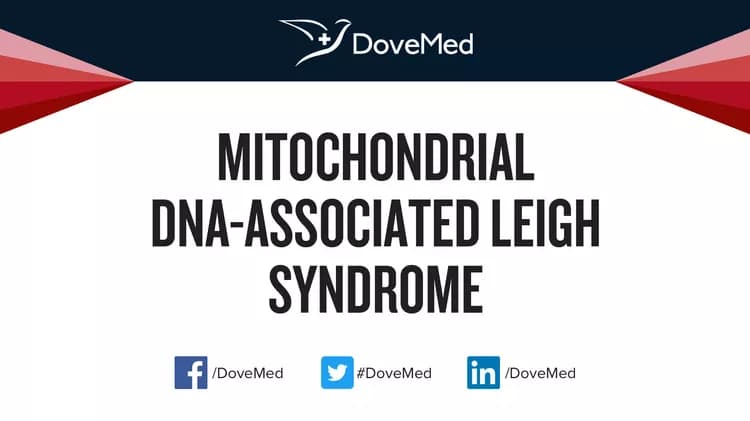What are the other Names for this Condition? (Also known as/Synonyms)
- Maternally Inherited Leigh Syndrome (MILS)
- Maternally-Inherited Subacute Necrotizing Encephalomyelopathy
- MILS (Maternally Inherited Leigh Syndrome)
What is Mitochondrial DNA-Associated Leigh Syndrome? (Definition/Background Information)
- Mitochondrial DNA-Associated Leigh Syndrome (or MILS) is a progressive brain disorder that usually appears in infancy or early childhood
- Affected children may experience vomiting, seizures, delayed development, muscle weakness, and problems with movement
- Heart disease, kidney problems, and difficulty breathing can also occur in people with this disorder. Mitochondrial DNA-Associated Leigh syndrome is a subtype of Leigh syndrome and is caused by changes in mitochondrial DNA
- Mutations in at least 11 mitochondrial genes have been found to cause Mitochondrial DNA-Associated Leigh Syndrome. This condition has an inheritance pattern known as maternal or mitochondrial inheritance
- Because mitochondria can be passed from one generation to the next only through egg cells (not through sperm cells), only females pass Mitochondrial DNA-Associated Leigh Syndrome to their children
(Source: Mitochondrial DNA-Associated Leigh Syndrome; Genetic and Rare Diseases Information Center (GARD) of National Center for Advancing Translational Sciences (NCATS), USA.)
Who gets Mitochondrial DNA-Associated Leigh Syndrome? (Age and Sex Distribution)
- Mitochondrial DNA-Associated Leigh Syndrome is a rare congenital disorder, and may occur at a frequency between 1:100,000-1:140,000
- The presentation of symptoms typically occur in infancy or childhood
- Both males and females may be affected
- Worldwide, individuals of all racial and ethnic groups may be affected
What are the Risk Factors for Mitochondrial DNA-Associated Leigh Syndrome? (Predisposing Factors)
- A positive family history may be an important risk factor, since Mitochondrial DNA-Associated Leigh Syndrome can be inherited
- Currently, no other risk factors have been clearly identified for the syndrome
It is important to note that having a risk factor does not mean that one will get the condition. A risk factor increases one’s chances of getting a condition compared to an individual without the risk factors. Some risk factors are more important than others.
Also, not having a risk factor does not mean that an individual will not get the condition. It is always important to discuss the effect of risk factors with your healthcare provider.
What are the Causes of Mitochondrial DNA-Associated Leigh Syndrome? (Etiology)
- Mitochondrial DNA-Associated Leigh Syndrome is caused by mutation(s) in genes carried on the mitochondria
- It is reported that over 11 genes may be involved; mutation(s) in these genes may be responsible for the disorder
- The condition is inherited in maternal or mitochondrial inheritance pattern. This type of inheritance is from a mother to her children, since the offspring inherit the mitochondrial DNA from the mother (in the cytoplasm of the egg) and not the father
What are the Signs and Symptoms of Mitochondrial DNA-Associated Leigh Syndrome?
The signs and symptoms of Mitochondrial DNA-Associated Leigh Syndrome may vary in type and severity among affected individuals, and include:
- Abnormal pattern of respiration
- CNS demyelination
- Dysarthria
- Dystonia
- Emotional lability
- Generalized hypotonia
- Global developmental delay
- Hepatocellular necrosis
- Hyperreflexia
- Hypertrichosis
- Increased CSF lactate
- Increased serum lactate
- Intellectual disability
- Lactic acidosis
- Ophthalmoplegia
- Pigmentary retinopathy
- Progressive
- Ptosis
- Respiratory failure
- Sensorineural hearing impairment
- Spasticity
(Source: Mitochondrial DNA-Associated Leigh Syndrome; Genetic and Rare Diseases Information Center (GARD) of National Center for Advancing Translational Sciences (NCATS), USA.)
How is Mitochondrial DNA-Associated Leigh Syndrome Diagnosed?
Mitochondrial DNA-Associated Leigh Syndrome is diagnosed on the basis of the following information:
- Complete physical examination
- Thorough medical history evaluation
- Assessment of signs and symptoms
- Laboratory tests
- Imaging studies
- Biopsy studies, if necessary
Many clinical conditions may have similar signs and symptoms. Your healthcare provider may perform additional tests to rule out other clinical conditions to arrive at a definitive diagnosis.
What are the possible Complications of Mitochondrial DNA-Associated Leigh Syndrome?
The complications of Mitochondrial DNA-Associated Leigh Syndrome may include:
- Failure to thrive in the neonatal period
- Encephalopathy
- Risk of falls and injury, if seizures are present
- Structural and functional abnormalities of the heart
- Respiratory distress
- Severe intellectual deficiency
Complications may occur with or without treatment, and in some cases, due to treatment also.
How is Mitochondrial DNA-Associated Leigh Syndrome Treated?
There is no cure for Mitochondrial DNA-Associated Leigh Syndrome, since it is a genetic condition. The treatment is usually given to manage the signs and symptoms and any complication that develops.
How can Mitochondrial DNA-Associated Leigh Syndrome be Prevented?
Currently, Mitochondrial DNA-Associated Leigh Syndrome may not be preventable, since it is a genetic disorder.
- Genetic testing of the expecting parents (and related family members), if available, and prenatal diagnosis (molecular testing of the fetus during pregnancy) may help in understanding the risks better during pregnancy
- If there is a family history of the condition, then genetic counseling will help assess risks, before planning for a child
- Active research is currently being performed to explore the possibilities for treatment and prevention of inherited and acquired genetic disorders
Regular medical screening at periodic intervals with tests and physical examinations are recommended.
What is the Prognosis of Mitochondrial DNA-Associated Leigh Syndrome? (Outcomes/Resolutions)
- The prognosis of Mitochondrial DNA-Associated Leigh Syndrome is dependent upon the severity of the signs and symptoms and associated complications, if any
- Individuals with mild conditions have better prognosis than those with severe symptoms and complications
- Typically, the prognosis may be assessed on a case-by-case basis
Additional and Relevant Useful Information for Mitochondrial DNA-Associated Leigh Syndrome:
The following DoveMed website link is a useful resource for additional information:
Related Articles
Test Your Knowledge
Asked by users
Related Centers
Related Specialties
Related Physicians
Related Procedures
Related Resources
Join DoveHubs
and connect with fellow professionals


0 Comments
Please log in to post a comment.